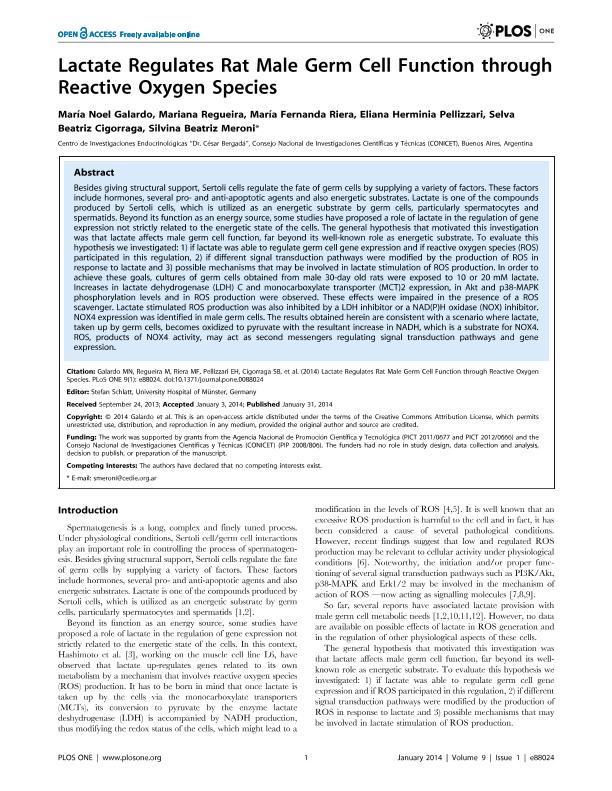Artículo
Lactate regulates rat male germ cell function through reactive oxygen species.
Galardo, Maria Noel Lujan ; Regueira, Mariana
; Regueira, Mariana ; Riera, Maria Fernanda
; Riera, Maria Fernanda ; Pellizzari, Eliana Herminia
; Pellizzari, Eliana Herminia ; Cigorraga, Selva Beatriz
; Cigorraga, Selva Beatriz ; Meroni, Silvina Beatriz
; Meroni, Silvina Beatriz
 ; Regueira, Mariana
; Regueira, Mariana ; Riera, Maria Fernanda
; Riera, Maria Fernanda ; Pellizzari, Eliana Herminia
; Pellizzari, Eliana Herminia ; Cigorraga, Selva Beatriz
; Cigorraga, Selva Beatriz ; Meroni, Silvina Beatriz
; Meroni, Silvina Beatriz
Fecha de publicación:
01/2014
Editorial:
Public Library Of Science
Revista:
Plos One
ISSN:
1932-6203
Idioma:
Inglés
Tipo de recurso:
Artículo publicado
Clasificación temática:
Resumen
Besides giving structural support, Sertoli cells regulate the fate of germ cells by supplying a variety of factors. These factors include hormones, several pro- and anti-apoptotic agents and also energetic substrates. Lactate is one of the compounds produced by Sertoli cells, which is utilized as an energetic substrate by germ cells, particularly spermatocytes and spermatids. Beyond its function as an energy source, some studies have proposed a role of lactate in the regulation of gene expression not strictly related to the energetic state of the cells. The general hypothesis that motivated this investigation was that lactate affects male germ cell function, far beyond its well-known role as energetic substrate. To evaluate this hypothesis we investigated: 1) if lactate was able to regulate germ cell gene expression and if reactive oxygen species (ROS) participated in this regulation, 2) if different signal transduction pathways were modified by the production of ROS in response to lactate and 3) possible mechanisms that may be involved in lactate stimulation of ROS production. In order to achieve these goals, cultures of germ cells obtained from male 30-day old rats were exposed to 10 or 20 mM lactate. Increases in lactate dehydrogenase (LDH) C and monocarboxylate transporter (MCT)2 expression, in Akt and p38-MAPK phosphorylation levels and in ROS production were observed. These effects were impaired in the presence of a ROS scavenger. Lactate stimulated ROS production was also inhibited by a LDH inhibitor or a NAD(P)H oxidase (NOX) inhibitor. NOX4 expression was identified in male germ cells. The results obtained herein are consistent with a scenario where lactate, taken up by germ cells, becomes oxidized to pyruvate with the resultant increase in NADH, which is a substrate for NOX4. ROS, products of NOX4 activity, may act as second messengers regulating signal transduction pathways and gene expression.
Palabras clave:
Lactate
,
Male Germ Cells
,
Reactive Oxygen Species
,
Mct-2
,
Ldh-C
Archivos asociados
Licencia
Identificadores
Colecciones
Articulos(CEDIE)
Articulos de CENTRO DE INVESTIGACIONES ENDOCRINOLOGICAS "DR. CESAR BERGADA"
Articulos de CENTRO DE INVESTIGACIONES ENDOCRINOLOGICAS "DR. CESAR BERGADA"
Citación
Galardo, Maria Noel Lujan; Regueira, Mariana; Riera, Maria Fernanda; Pellizzari, Eliana Herminia; Cigorraga, Selva Beatriz; et al.; Lactate regulates rat male germ cell function through reactive oxygen species.; Public Library Of Science; Plos One; 9; 1-2014; 88024-88024
Compartir
Altmétricas



